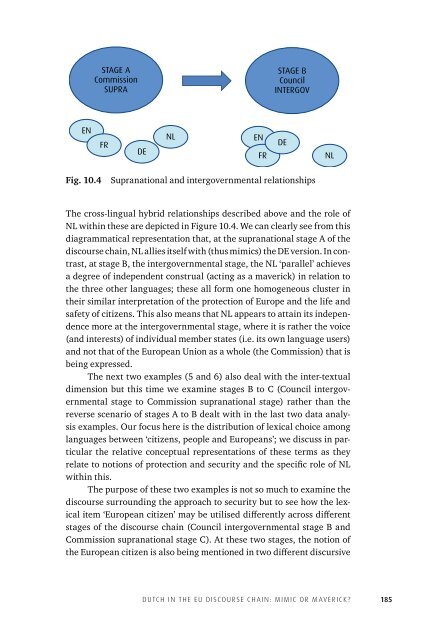Discord Consensus
7aze300jFJo
7aze300jFJo
You also want an ePaper? Increase the reach of your titles
YUMPU automatically turns print PDFs into web optimized ePapers that Google loves.
STAGE A<br />
Commission<br />
SUPRA<br />
STAGE B<br />
Council<br />
INTERGOV<br />
EN<br />
FR<br />
DE<br />
NL<br />
EN<br />
FR<br />
DE<br />
NL<br />
Fig. 10.4<br />
Supranational and intergovernmental relationships<br />
The cross-lingual hybrid relationships described above and the role of<br />
NL within these are depicted in Figure 10.4. We can clearly see from this<br />
diagrammatical representation that, at the supranational stage A of the<br />
discourse chain, NL allies itself with (thus mimics) the DE version. In contrast,<br />
at stage B, the intergovernmental stage, the NL ‘parallel’ achieves<br />
a degree of independent construal (acting as a maverick) in relation to<br />
the three other languages; these all form one homogeneous cluster in<br />
their similar interpretation of the protection of Europe and the life and<br />
safety of citizens. This also means that NL appears to attain its independence<br />
more at the intergovernmental stage, where it is rather the voice<br />
(and interests) of individual member states (i.e. its own language users)<br />
and not that of the European Union as a whole (the Commission) that is<br />
being expressed.<br />
The next two examples (5 and 6) also deal with the inter-textual<br />
dimension but this time we examine stages B to C (Council intergovernmental<br />
stage to Commission supranational stage) rather than the<br />
reverse scenario of stages A to B dealt with in the last two data analysis<br />
examples. Our focus here is the distribution of lexical choice among<br />
languages between ‘citizens, people and Europeans’; we discuss in particular<br />
the relative conceptual representations of these terms as they<br />
relate to notions of protection and security and the specific role of NL<br />
within this.<br />
The purpose of these two examples is not so much to examine the<br />
discourse surrounding the approach to security but to see how the lexical<br />
item ‘European citizen’ may be utilised differently across different<br />
stages of the discourse chain (Council intergovernmental stage B and<br />
Commission supranational stage C). At these two stages, the notion of<br />
the European citizen is also being mentioned in two different discursive<br />
Dutch in the EU discourse chain: mimic or maverick? 185


